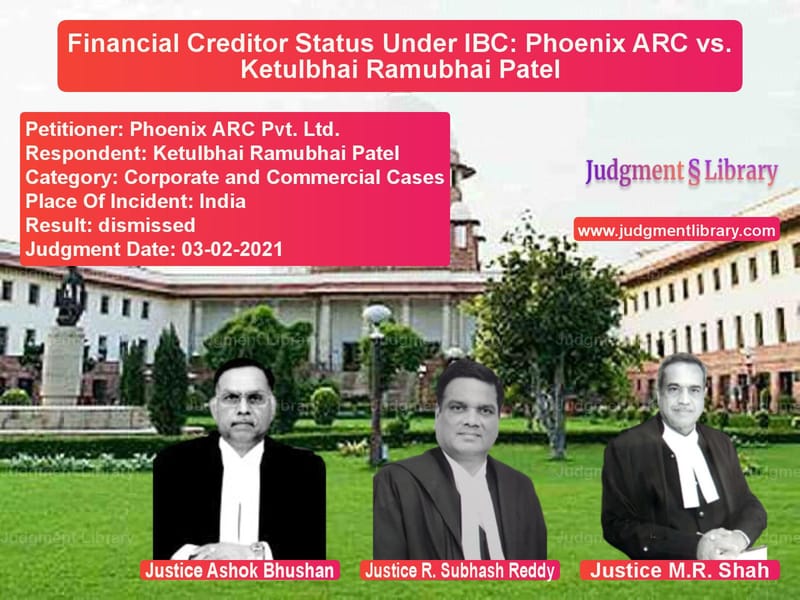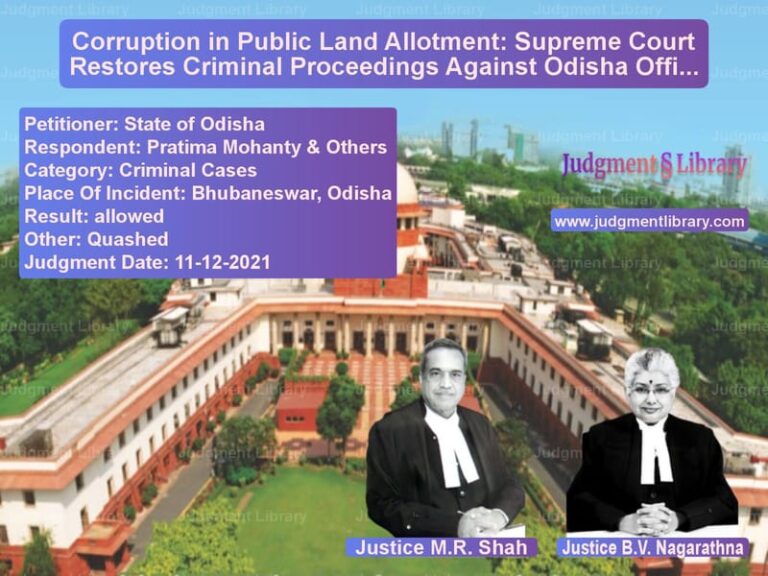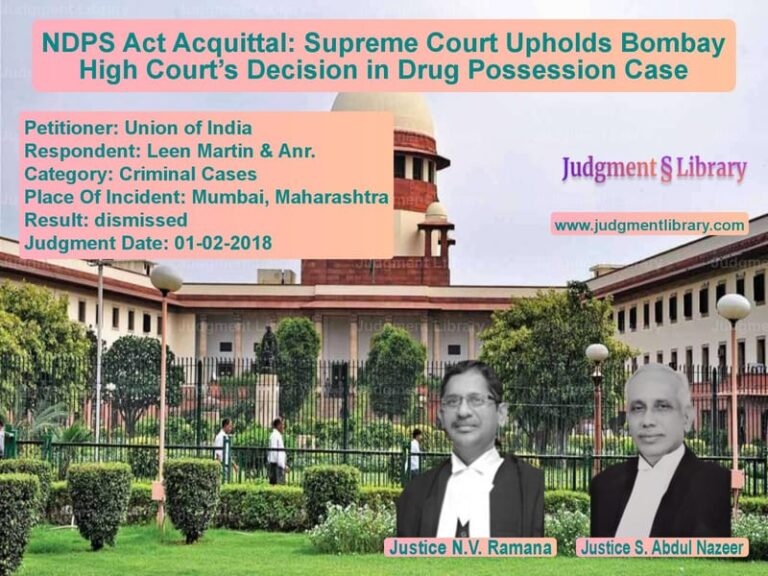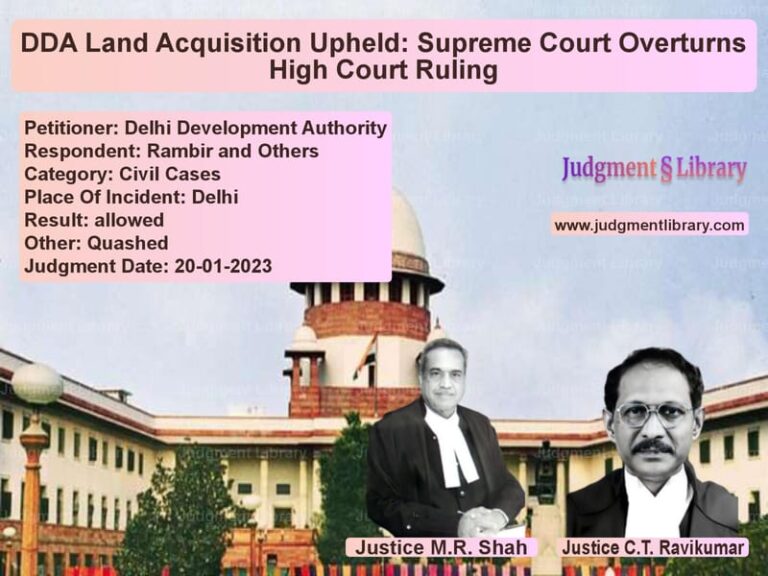Financial Creditor Status Under IBC: Phoenix ARC vs. Ketulbhai Ramubhai Patel
The case of Phoenix ARC Pvt. Ltd. vs. Ketulbhai Ramubhai Patel is a landmark judgment concerning the interpretation of financial creditor status under the Insolvency and Bankruptcy Code, 2016 (IBC). The Supreme Court examined whether a pledge of shares by a corporate debtor to secure a loan for a third party qualifies the pledgee as a financial creditor under Section 5(8) of the IBC.
Background of the Case
Phoenix ARC Pvt. Ltd. filed an appeal under Section 62 of the IBC, challenging the decision of the National Company Law Appellate Tribunal (NCLAT) dated April 9, 2019, which upheld the rejection of Phoenix ARC’s claim as a financial creditor by the National Company Law Tribunal (NCLT), Mumbai Bench.
The dispute originated from a financial transaction where L&T Infrastructure Finance Company Limited had extended a financial facility of Rs. 40 crores to Doshion Limited through a Facility Agreement dated May 12, 2011. As a part of the security arrangement, Doshion Veolia Water Solutions Private Limited (corporate debtor) pledged 40,160 shares of Gondwana Engineers Limited (GEL) in favor of L&T Infrastructure Finance.
Subsequently, L&T Infrastructure Finance assigned its rights and obligations under the Facility Agreement to Phoenix ARC on December 30, 2013. The borrower failed to repay the debt, leading to the initiation of insolvency proceedings against Doshion Veolia Water Solutions Private Limited.
Phoenix ARC filed a claim for Rs. 83.49 crores, seeking recognition as a financial creditor of the corporate debtor. However, the Resolution Professional rejected the claim, stating that the corporate debtor had not borrowed money but had merely pledged shares as collateral, which did not constitute a financial debt under Section 5(8) of the IBC.
Key Legal Issues
- Whether a pledge of shares by a corporate debtor to secure a third party’s loan constitutes a financial debt.
- Whether Phoenix ARC, as the assignee of L&T Infrastructure Finance, qualifies as a financial creditor.
- The scope of the term “financial debt” under Section 5(8) of the IBC.
- The applicability of the Supreme Court’s ruling in Jaypee Infratech Limited vs. Axis Bank Limited to the present case.
Arguments by Phoenix ARC
- Phoenix ARC argued that the corporate debtor had undertaken an obligation by pledging shares to secure the financial facility provided to Doshion Limited.
- It contended that the pledge was essentially a guarantee, making the corporate debtor a financial debtor under Section 5(8)(i) of the IBC.
- It claimed that the liability of a surety is co-extensive with that of the borrower under Section 128 of the Indian Contract Act, 1872.
- Phoenix ARC further argued that the NCLT and NCLAT had erred in treating the pledge as a mere security arrangement rather than a financial obligation.
Arguments by Ketulbhai Ramubhai Patel (Resolution Professional)
- The respondent countered that the corporate debtor had not borrowed any money and had merely pledged shares, which did not qualify as a “financial debt.”
- It was argued that Section 5(8) of the IBC requires a “disbursement against the consideration for the time value of money,” which was absent in the case of a pledge.
- The Resolution Professional relied on the Supreme Court’s ruling in Jaypee Infratech, where it was held that third-party securities do not create financial debt unless they amount to a guarantee.
- The respondent also pointed out that the pledge agreement did not contain any clause making the corporate debtor responsible for repaying the borrower’s debt.
Supreme Court’s Analysis
The Supreme Court analyzed the provisions of the IBC and the Indian Contract Act to determine whether the pledge of shares constituted a financial debt. The Court made the following key observations:
- “The definition of financial debt in Section 5(8) of the IBC requires a debt disbursed against the consideration for the time value of money.”
- “A mere pledge of shares does not satisfy the requirements of Section 5(8), as it does not involve a borrowing or an obligation to repay.”
- “For a transaction to qualify under Section 5(8)(i), there must be an explicit guarantee or indemnity obligating the corporate debtor to discharge a financial liability.”
- “The decision in Jaypee Infratech squarely applies, reinforcing that a security interest does not automatically confer the status of a financial creditor.”
The Court emphasized that while a security interest may create rights in favor of a creditor, it does not necessarily translate into financial creditor status unless the corporate debtor is liable for repayment.
Final Judgment
The Supreme Court dismissed the appeal, ruling that:
- Phoenix ARC was not a financial creditor under the IBC.
- The pledge of shares did not create a financial obligation enforceable under Section 5(8).
- The decisions of the NCLT and NCLAT rejecting Phoenix ARC’s claim were correct.
- The appellant was free to pursue remedies under other applicable laws, but it could not be included in the Committee of Creditors.
Implications of the Judgment
This judgment has significant implications for financial transactions and insolvency proceedings:
- It clarifies that a pledge of shares does not constitute a financial debt under the IBC.
- It reinforces that financial creditor status requires an obligation to repay, not merely a security interest.
- It upholds the principle that third-party securities do not automatically confer financial creditor rights.
- It provides guidance for future insolvency cases involving pledged assets.
Conclusion
The Supreme Court’s decision in Phoenix ARC vs. Ketulbhai Ramubhai Patel reinforces the core principles of the IBC by ensuring that only creditors with a financial claim against the corporate debtor can participate in insolvency proceedings. The ruling prevents misuse of the financial creditor framework and ensures that the resolution process remains fair and effective for all stakeholders.
Read also: https://judgmentlibrary.com/supreme-court-clarifies-contempt-of-court-in-family-business-dispute/
Petitioner Name: Phoenix ARC Pvt. Ltd..Respondent Name: Ketulbhai Ramubhai Patel.Judgment By: Justice Ashok Bhushan, Justice R. Subhash Reddy, Justice M.R. Shah.Place Of Incident: India.Judgment Date: 03-02-2021.
Don’t miss out on the full details! Download the complete judgment in PDF format below and gain valuable insights instantly!
Download Judgment: phoenix-arc-pvt.-ltd-vs-ketulbhai-ramubhai-p-supreme-court-of-india-judgment-dated-03-02-2021.pdf
Directly Download Judgment: Directly download this Judgment
See all petitions in Bankruptcy and Insolvency
See all petitions in Corporate Governance
See all petitions in Company Law
See all petitions in Shareholder Disputes
See all petitions in unfair trade practices
See all petitions in Judgment by Ashok Bhushan
See all petitions in Judgment by R. Subhash Reddy
See all petitions in Judgment by Mukeshkumar Rasikbhai Shah
See all petitions in dismissed
See all petitions in supreme court of India judgments February 2021
See all petitions in 2021 judgments
See all posts in Corporate and Commercial Cases Category
See all allowed petitions in Corporate and Commercial Cases Category
See all Dismissed petitions in Corporate and Commercial Cases Category
See all partially allowed petitions in Corporate and Commercial Cases Category







